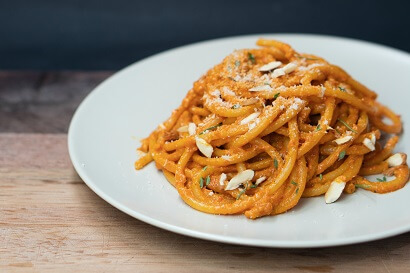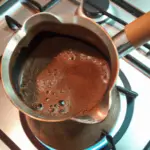To get al dente pasta, you must cook pasta at the right temperature. But, should you be boiling or simmering pasta?

Pasta water should always be brought to a boil. Once pasta is added to the boiling water, is important that the water is brought back up to the boiling point as quickly as possible. If pasta is simmered, it can be difficult to make it al dente.
On this page, we want to tell you exactly why pasta should be boiled and not simmered. We also want to teach you how to cook pasta perfectly al dente. If you have never cooked pasta before, or you want the ‘ultimate guide’ to cooking pasta, then this is it.
Should Pasta Be Boiled or Simmered?
When you are boiling pasta, your goal is to get it al dente. This is when pasta has the perfect texture. It will be cooked, but still slightly firm to the bite.
To get the pasta al dente, it needs to be cooked in water for as little time as possible. The longer the pasta is in the water, the more chance there is of the proteins and starches in the pasta interacting. When this happens, the pasta goes soft.
This is why you need to boil and not simmer pasta. If you simmer, the cooking process takes much longer, and this could ruin your pasta. In addition to this, longer boiling times can lead to pasta sticking and starchy water. Both can also ruin the flavor.
The Proper Way to Cook Pasta
Once you know what you are doing, pasta is a simple dish to cook. All you need is some sauce to match, and you have a dish that can be prepared in minutes.
This step-by-step guide will teach you how to boil pasta and noodles. All you need is:
- Salt
- A cooking pot
- Pasta
Contrary to popular belief, you do not need to add olive oil or flour to the pasta. Some people claim that this can stop the pasta from sticking together. However, as long as the pasta cooks properly, there is no chance of it releasing enough starch to cause it to become sticky.
Step 1: Fill Your Pot With Water
A large pot is preferred for cooking pasta. Stock pots are a good option.
While pasta in a small pot will boil faster, it will have less space to move around. This can make it tougher to cook than in a big pot.
A pound of pasta will need five or six quarts of water. Although, it doesn’t matter how much water you add, as long as the pasta would be fully covered when the water is at a full boil.
The more water you add, the longer it will take to boil.
Step 2: Salt The Water
For every 6 quarts of water, you need to add 2 tablespoons of coarse salt. So, how much salt will depend on how much water you added in the previous step.
If you do not add salt to pasta, then your pasta will taste bland. Salt is vital for seasoning. Well-salted pasta will make your sauce taste considerably better.
Step 3: Boil Your Pot of Water
Turn your stove to high heat and heat your pan. Things will go quicker if you leave the lid on the pan.
You are aiming for a rolling boil here. This means that the water should be bubbling vigorously. It should only take a few minutes to get your pot to this at high heat.
Step 4: Add Your Pasta or Noodles
When that water is bubbling vigorously, add your pasta or noodles. Do not turn the heat down. Instead, give the pasta a good stir and put the lid back on.
You aim to bring the temperature back up as quickly as possible. You want that pasta to be cooking at a rolling boil.
When you hear the water bubbling, remove the lid.
Step 5: Check The Pasta Packaging
Cooking times can vary between pasta types. For example, noodles will cook faster than fettuccine.
Pasta packages will always give you rough timings for cooking your pasta. Use this as a guide. It doesn’t matter how much pasta is being cooked. A pound of pasta will take just as long to cook as a quarter pound of noodles.
Step 6: Stir
From the moment that you add the pasta to the water, you need to be stirring every couple of minutes. This will prevent the pasta from sticking together while you cook.
Step 7: 2 Minutes Before The Suggested Cook Time
2 minutes before the end of the suggested cooking time, you should pull a piece of pasta out of the water. You need to check whether it is al dente.
Al dente pasta will taste cooked, but it will still have a bit of bounce when you bite into it. If there is a bit of a crunch, your pasta isn’t ready. You can cook it for a couple more minutes. Make sure that you give it a good stir.
You mustn’t overcook. If the pasta is left to boil too long, it will become soggy.
Step 8: Drain The Pasta
Once your pasta is done, give it one last stir and then drain it as quickly as possible.
Remember, when you remove the pasta from the heat, it will continue to cook as long as it is in the water. So, you need to get it out of the water and added to that source as quickly as possible.
If you aren’t planning on using the pasta right away (this is not suggested), then it can be added to a smaller pot with a lid. Although, this may ruin the texture of the pasta.
How Do You Stop Cooking Pasta?
If you want to have al dente pasta, then you need to stop the cooking process as quickly as possible.
People have come up with many ideas to quickly stop the cooking process. This includes:
- Shocking the pasta water with cold water.
- Shocking the pasta water with a couple of pinches of salt.
- Draining the pasta water as quickly as possible.
We suggest that you avoid shocking with cold water or salt. This is going to ruin the flavor of the cooking pasta. The cold water will be especially problematic as it can ruin the al dente texture.
Ideally, you should drain and serve pasta as soon as you finish cooking. This means that you should have your sauce ready. If you don’t serve the pasta immediately, then it will continue cooking on its residual heat. This will ruin the texture.
The pasta sauce should be enough to ‘shock’ the pasta and stop it from cooking more. It will taste a lot better too.
Do You Boil Fresh Pasta?
Just like dry pasta, fresh pasta should always be added to boiling cooking water. The process for cooking is very similar to the process of cooking dried pasta e.g. boil water, add the pasta, etc. However, fresh pasta is cooked at a boil for completely different reasons.
Fresh pasta is different from dry pasta. It is made using eggs and it is slightly softer. It cannot be cooked al dente, which makes it a great pasta for pasta sauce.
The reason why fresh cooks at a boil is not to get the perfect al dente bite, but because you want to lock in the flavors. You need that pasta to be in the water for as little time as possible. The longer it is in the water, the more the flavor will cook off.
Do Times Vary For Cooking Pasta?
Cooking times do vary from pasta to pasta.
If you have bought pasta from the store, then it should always say how long it should take to cook. You will want to start checking the pasta’s texture two minutes before the end of the suggested cooking time.
Generally speaking, the thicker the pasta, the longer it will take to cook. Long-strand pasta e.g. noodles and spaghetti will cook within a couple of minutes, while penne could easily take 8-10 minutes.
If you have made your pasta, then it is going to be guesswork. You should be constantly checking the pasta to ensure that it is al dente. You can start doing this after 4-5 minutes.
What Does Al Dente Mean?
Al dente is an Italian term that means ‘to the tooth’. When your pasta is ‘al dente’, you know that it is cooked perfectly. Of course, this does mean that you need to know what the term means.
When we say something is ‘al dente’, it means that the pasta offers a little bit of resistance when you bite into it. It is slightly firm, but not so firm that it is crunchy. It is almost rubbery, or even spongy in texture. Some have even described the texture as ‘bouncy’.
Pasta needs to be cooked ‘al dente’ because once you take the pasta off of the hob, it will continue to cook. When you add it to the sauce, it will continue to cook. If you cook your pasta too soft, then it will end up all mushy and flavorless. It can ruin a good dish.
Final Thoughts
Pasta should never be simmered. If you simmer your pasta, you will ruin it.
From start to finish, pasta should only ever be cooked in boiling water. This will help to lock in the flavor and ensure that you get al dente pasta.
If you cook your pasta or noodles properly, then they will taste so much better once you add them to the sauce.
- The Top Restaurants Specializing in Truffle Dishes - August 10, 2023
- Truffle Panna Cotta: A Decadent Dessert Recipe for Truffle Lovers - August 7, 2023
- Truffle Scrambled Eggs: A Luxurious Breakfast Delight - August 7, 2023








